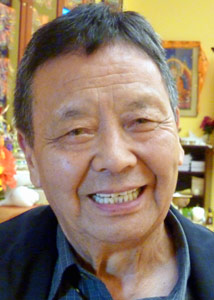Name: Thinlay Chogyal
(Alias: No)
Gender: Male
Interview Age: 70
Date of Birth: 1943
Birthplace: Phenpo, Utsang, Tibet
Year Left Tibet: 1959
Profession: Monk
Monk/Nun: Previously
Political Prisoner: No

Interview No.: 18C
Date: 2014-05-10
Language: Tibetan
Location: Portland, Oregon, United States
Categories: Culture and History
Keywords: childhood memories, escape experiences, farm life, guerrillas in Mustang, monastic life, refugee in India -- life as, taxes, Utsang
Summary:
Thinlay Chogyal was born into a wealthy farming family in Phenpo near Lhasa. His family farmed a large amount of land leased from the Drepung Monastery. He describes the system of loaning grain to the poor people at the time of sowing, the rate of interest charged and the system of paying taxes to the monasteries based on land holdings.
Thinlay Chogyal shares his feelings about being made a monk around 11 or 12 years of age by his parents at the Nalanda Monastery. He was sent to live at the ladang 'high lama's residence' of Simwog Rinpoche, which was different from living in a monastery. He offers insight into the life and intense practices of Simwog Rinpoche.
After the Chinese army bombed Lhasa, a large number of people fled through his region. Simwog Rinpoche performed a divination to decide whether to flee or remain in Tibet. Thinlay Chogyal explains how the zenril divination was conducted and the results prompted Rinpoche to leave his home. A group of around 60 people fled to Nepal on a 3-month journey. Once in Nepal Thinlay Chogyal served as a clerk for the Chushi Gangdrug Defend Tibet Volunteer Force that had re-grouped in Mustang. He later travelled to Dharamsala, India to find Simwog Rinpoche and got a job in the Tibetan Administration's Education Department.
Interview Team:
- Marcella Adamski (Interviewer)
- Tony Sondag (Videographer)
- Tenzin Yangchen (of Portland, OR) (Interpreter)

